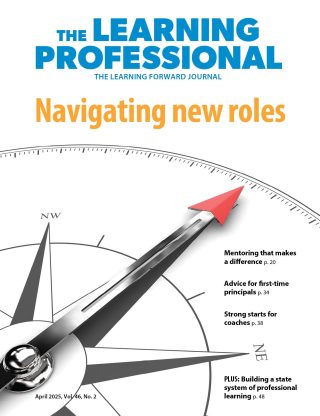Read the remaining content with membership access. Join or log in below to continue.
Sed ut perspiciatis unde omnis iste natus error sit voluptatem accusantium doloremque laudantium, totam rem aperiam, eaque ipsa quae ab illo inventore veritatis et quasi architecto beatae vitae dicta sunt explicabo. Nemo enim ipsam voluptatem quia voluptas sit aspernatur aut odit aut fugit, sed quia consequuntur magni dolores eos qui ratione voluptatem sequi nesciunt. Neque porro quisquam est, qui dolorem ipsum quia dolor sit amet, consectetur, adipisci velit, sed quia non numquam eius modi tempora incidunt ut labore et dolore magnam aliquam quaerat voluptatem.
Outcomes: Professional learning that increases educator effectiveness and results for all students aligns its outcomes with educator performance and student curriculum standards.
Examples of Educator Performance Standards
Examples of Student Content Standards
References
Cohen, D. & Hill, H. (2000). Instructional policy and classroom performance: The mathematics reform in California. Teachers College Record, 102(2), 294-343.
Darling-Hammond, L. (1996). The right to learn and the advancement of teaching: Research, policy, and practice for democratic education. Educational Researcher, 25(6), 5-17.
Desimone, L. (2009). Improving impact studies of teachers’ professional development: Toward better conceptualizations and measures. Educational Researcher, 38(3), 181-199.
Fullan, M. (2007). The new meaning of educational change (4th ed.). New York, NY: Teachers College Press.
Garet, M.S., Porter, A., Desimone, L., Birman, B., & Yoon, K.S. (2001, Winter). What makes professional development effective? Results from a national sample of teachers. American Educational Research Journal, 38(4), 915-945.
Kennedy, M. (1998, March). Education reform and subject matter knowledge. Journal of Research in Science Teaching, 35(3), 249-263.
Killion, J. (1999). What works in the middle: Results-based staff development. Oxford, OH: NSDC.
Killion, J. & Roy, P. (2009). Becoming a learning school. Oxford, OH: NSDC.
Learning Forward. (2011). Standards for Professional Learning. Oxford, OH: Author.
McLaughlin, M. (1993). What matters most in teachers’ workplace context? In J.W. Little & M.W. McLaughlin (Eds.), Teachers’ work: Individuals, colleagues, and contexts. New York, NY: Teachers College Press.
Rosenholtz, S. (1989). Teachers’ workplace. New York, NY: Longman.
Safire, W. (2007, April 1). On Language: Sweet spot. The Times Magazine. Available at www.nytimes.com/2007/04/01/magazine/01wwln-safire.t.html?fta=y.
Wenger, E. (1998). Communities of practice: Learning, meaning, and identity. Cambridge, Unnited Kingdom: Cambridge University Press.
Learning Forward is the only professional association devoted exclusively to those who work in educator professional development. We help our members plan, implement, and measure high-quality professional learning so they can achieve success with their systems, schools, and students.
Recent Issues
LEARNING DESIGNS
February 2025
How we learn influences what we learn. This issue shares essential...
BUILDING BRIDGES
December 2024
Students benefit when educators bridge the continuum of professional...
CURRICULUM-BASED PROFESSIONAL LEARNING
October 2024
High-quality curriculum requires skilled educators to put it into...
LEARNING TO PIVOT
August 2024
Sometimes new information and situations call for major change. This issue...













